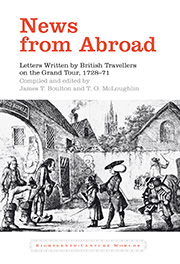Book contents
- Frontmatter
- Contents
- Preface
- Illustrations
- Acknowledgements
- ‘Old Style’ and ‘New Style’ Dating
- Map
- Introduction: The Grand Tour
- The Tourists and Their Letters
- George Lyttelton (1709–73): Letters (1728–30)
- Joseph Spence (1699–1768): Letters (1730–3)
- James Boswell (1740–95): Letters (1764–6)
- James Barry (1741–1806): Letters (1765–71)
- Caroline Lennox (1723–74): Letters (1766–7)
- Appendix A The Hazards of Collecting Art on the Grand Tour
- Appendix B Advice to Travellers on the Grand Tour
- Bibliography
- Index
James Barry (1741–1806): Letters (1765–71)
- Frontmatter
- Contents
- Preface
- Illustrations
- Acknowledgements
- ‘Old Style’ and ‘New Style’ Dating
- Map
- Introduction: The Grand Tour
- The Tourists and Their Letters
- George Lyttelton (1709–73): Letters (1728–30)
- Joseph Spence (1699–1768): Letters (1730–3)
- James Boswell (1740–95): Letters (1764–6)
- James Barry (1741–1806): Letters (1765–71)
- Caroline Lennox (1723–74): Letters (1766–7)
- Appendix A The Hazards of Collecting Art on the Grand Tour
- Appendix B Advice to Travellers on the Grand Tour
- Bibliography
- Index
Summary
James Barry, the eldest child of John and Juliana Barry of Cork in Ireland, had shown promise as an artist from his earliest days. At just 20 he was awarded a premium at the Dublin Society's annual exhibition for his painting The Baptism of the King of Cashel by St Patrick. At about the same time he met Edmund Burke in Dublin through their mutual friend Dr Fenn Sleigh, a physician in Cork who had schooled Barry in the classics. Burke soon arranged for Barry to move to London where, in 1764, he found him a position as an assistant to the antiquarian and painter ‘Athenian’ Stuart. Both Sleigh and Burke recognised his talent and encouraged him to pursue his art studies on the Continent. But Barry could not afford that. By mid-1765, however, the finances of Burke and his kinsman William Burke had so improved that they agreed to pay for Barry to study on the Continent, and he left for Paris in October. Overwhelmed by the kindness of his patrons, and determined to live up to their expectations, he set off on a tour that would take him to the great art galleries of France and Italy. There he would study and practise art on the grand scale: his ambition was to be a great history painter. If the Grand Tour was designed to educate young gentlemen by exposure to the finest art of Classical and Renaissance culture, Barry was one of its exemplary pupils.
- Type
- Chapter
- Information
- News from AbroadLetters Written by British Travellers on the Grand Tour, 1728–71, pp. 169 - 212Publisher: Liverpool University PressPrint publication year: 2012



